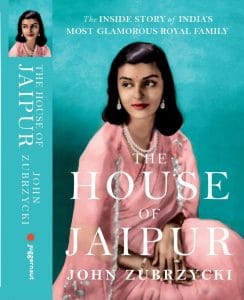On 20 October 1962, the People’s Liberation Army launched a full-scale invasion of India’s north-eastern borderlands and Ladakh, catching poorly equipped Indian troops by surprise. Some of the fighting took place just a couple of hundred kilometres from Cooch Behar. The war sparked a furious debate in Parliament. Ayesha [Gayatri Devi] took the first opportunity she could to attack the government’s concealment of repeated incursions into India by China over the past several years and Nehru’s use of the Defence of India Act to silence opposition to government policies. Nehru responded by ridiculing the opposition, prompting Ayesha to blurt out: ‘If you had known anything about anything, we wouldn’t be in this mess today.’ When Nehru pretended to ignore her remark, she repeated it in ‘more parliamentary language’. This time the prime minister responded: ‘I will not bandy words with a lady,’ to which the opposition members called out, ‘Chivalry,’ in mocking tones. Jai [Man Singh ll, maharaja of Jaipur] was much softer in his approach in his Rajya Sabha speech, emphasizing the need for compromise and accommodation, urging better relations with Pakistan and calling on India to form an alliance with the United States and Great Britain.
Also read: Nehru loved India, but the things he did were not right for India — Gayatri Devi in 2006
On the day of her outburst, Khushwant Singh recalls seeing Ayesha at a private party at the home of the Swatantra Party’s leader in the Lok Sabha, Minoo Masani, where the peace activist Jayaprakash Narayan was the chief guest. Narayan was giving a briefing on the progress of negotiations with Naga tribals wanting to secede from India. Ayesha turned up late, her entry heralded by a ‘whiff of expensive French perfume’. She was wearing a turquoise blue chiffon sari with sliver sequins that sparkled ‘like stars on a moonless night’. As Khushwant Singh would later write: ‘She looked around her with large almond eyes. Everyone stood up. As Hilaire Belloc once described someone, “her face was like the king’s command when all the swords are drawn”.’ After asking everyone to sit, Ayesha sank down on the carpet, took out a mauve-coloured cigarette from a gold case and started smoking, prompting Narayan to remark in Hindi: ‘Dekho zamana kaise badal gaya hai – see how times have changed – a maharani sits at the feet of a commoner.’ She then addressed the meeting in English, apologizing that her Hindustani was not good because her mother tongue was Bengali and she was married to a Rajput. As she was speaking, the man sitting next to Khushwant Singh leaned over and said: ‘Her Bengali and Rajasthani are worse than her Hindustani. She can only speak English and French.’ Later that day, Jai and Ayesha were spotted at a cocktail dance at the Gymkhana Club, where they drank French champagne. Jai did not sign the drinks bill. ‘It was the gift of erstwhile subjects and admirers,’ Singh wryly noted.
A fierce critic of Ayesha’s political style was the journalist L.M. Eshwar, who described the Rajasthan chapter of the Swatantra Party as the ‘Quinquennial Party of the Glamour Queen’. ‘Once in five years during voting season, it is here, there and everywhere. Afterwards it is not seen or heard anywhere for another five years.’ Eshwar, who doesn’t hide his anti-monarchical views in his 1968 book, Sunset and Dawn: The Story of Rajasthan, claims there were bitter divisions within the Swatantra Party between the ‘Maharani’s group’ and those opposed to Ayesha’s high-handedness in running the affairs of the party and insistence on nominating her candidates for assembly and Lok Sabha elections. Local party workers complained to the party’s national leadership about her autocratic style but got nowhere, so entrenched was her position. Thanks to her, claims Eshwar, there was no opposition worth the name in Rajasthan.
Also read: Gayatri Devi, princess-politician and Indira Gandhi critic who was jailed during Emergency
While such criticism might be expected from a leftist, there were also rumblings of discontent from within Swatantra. Masani took a dim view of Ayesha’s commitment to politics despite her popularity among voters. ‘He was constantly fed up with her,’ says his son, Zareer Masani. ‘When she was needed for electioneering she was holidaying in England or the South of France.’ Nor was she a conventional politician. ‘She didn’t pay much attention to Parliament. My father used to contrast her unfavourably with the Maharani of Gwalior [Vijayaraje Scindia], who was much more engaged. The Maharani of Jaipur was primarily a socialite, whereas the Maharani of Gwalior was primarily a politician.’
Despite her differences with Nehru, Ayesha, along with the majority of Indians, mourned his death in 1964. At a Swatantra meeting she told the party members that she felt his loss deeply. ‘He had given up an easy life to work for the independence of his country. While there were those who disagreed with some of his policies, no one could argue with the fact that he loved India and India loved him.’ Nehru’s replacement was Lal Bahadur Shastri. Shortly after taking office, he offered Jai an ambassadorship, probably in the hope that Ayesha would follow him and thereby leave politics. Of the three countries he could choose from, Jai opted for Spain. A shared love of polo was one obvious reason.
His decision to take up the post also reflected Jai’s disillusionment with local politics. In October 1965, he addressed a meeting of the Rajput Sabha of which he was president, attacking them for their weakness, their lack of ‘trustworthy loyalty’ and their ‘mental, spiritual and political bankruptcy’. Justifying his decision to go to Spain he said: ‘I am convinced that I can serve our country better in other ways than by remaining and vegetating in the senseless and useless morass of petty local politics of Rajasthan.’

This excerpt from The House of Jaipur: The Inside Story of India’s Most Glamorous Royal Family has been published with special permission from Juggernaut.







One of the stupidest, most vapid articles to have come out of your stable till now. Please stop publishing this sort of anti-intellectual crap of you wish to retain readers…
What and who is or was ‘Maharani’ Gayatri Devi? Have you also tried to find out if the janitor at the Taj or a crooner at Trinka’s also had an opinion on Nehru?
non sense